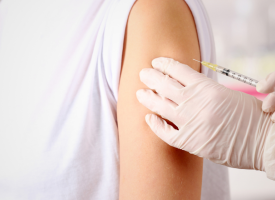Transcript - Dr Gannon - ABC Alice Springs - Meningococcal vaccine
Transcript: AMA President, Dr Michael Gannon, with Nadine Maloney, ABC Radio Alice Springs, Breakfast, 5 December 2017
Subject: Meningococcal vaccine, National Centre for Disease Control
NADINE MALONEY: As you've been hearing in the news this morning, the Northern Territory branch of the Australian Medical Association is calling for a nationwide approach to recent meningococcal outbreaks. There's been 40 cases of various strains of the disease this year across the country; 18 patients had the W strain, and most of those cases were amongst Aboriginal children in Central Australia, but five people have died from the W strain in Western Australia.
Dr Michael Gannon, President of the Australian Medical Association, good morning.
MICHAEL GANNON: Good morning.
NADINE MALONEY: What makes this W strain particularly nasty?
MICHAEL GANNON: Look, every variety of meningococcus is a nasty strain. It's not a new bacterium; it's been known to cause carnage, misery, and death for some time, but the case for addition to the national immunisation protocol becomes stronger by the day. We need to see action from the Commonwealth Government.
NADINE MALONEY: What does it take for that to happen, to go onto the National Immunisation Program?
MICHAEL GANNON: Well, one thing I will say, I'll congratulate my colleagues in the Northern Territory who've shown a lot of leadership on this field, and also in the call for a National Centre for Disease Control. Infections like this don't respect State and Territory borders; we know that there's threats from infectious agents coming from overseas. In terms of the decision for that, whether or not vaccines are listed on the national scheme, Government listens to their experts and then ultimately, like every other element in the health system, it becomes a funding issue. But I think that when you look at last year's data and this year's data, I think we're moving very close to a time where we have to demand that this is on the national scheme. It's simply causing too much damage and with vaccination, like many other things, it is near entirely preventable.
NADINE MALONEY: So the NTAMA are calling for a nation-wide approach. Up until now, what sort of communication or coordination has there been between the States and Territories?
MICHAEL GANNON: Well, the simple answer is that there's not a great deal of co-ordination and certainly it's not the responsibility of the States to fund vaccination programs. Now, the States deliver them, sometimes through their child health nurse programs, and there are other ways in which the States coordinate the rollout of vaccinations, but if you look at everything else which is on the national program, the decisions are made nationally.
Now, we commend Government when it listens to the advice of its experts; if we're talking about new medications and sometimes new implants, prosthes, et cetera, that goes through the Therapeutic Goods Administration. They are also involved in licensing vaccines, but the clinician-led bureaucracy which makes these decisions is ATAGI [Australian Technical Advisory Group on Immunisation], and I think that what we're seeing with this breakout of different forms of meningococcal infection, we need to move beyond the meningococcal B vaccination program and seriously look at introducing nation-wide the ACWY quadrivalent vaccine. That will prevent disability, it will prevent deaths in young people. I think the case for its cost effectiveness is close, I think the moral case is there to introduce it to the national program.
NADINE MALONEY: Wouldn't a broader vaccine like that have been the better choice in the first place?
MICHAEL GANNON: Well certainly when it comes to these vaccines, we do need to be careful to make sure that the evidence is there. There are …
NADINE MALONEY: Sure.
MICHAEL GANNON: Let's face it, there are limited funds. My children had meningococcal B vaccine this week: that's two lots of $150. Now, that is beyond the means of many Australians. What we have to do is make the case that this is a useful area of health spending, bearing in mind that every part of the health budget is valuable to some people. But certainly I applaud the leadership of my AMA colleagues in the Northern Territory. I think that this is an infectious disease that is becoming more prevalent, and because of its tendency to infect people in their late teens and early adulthood, the value of preventing severe disability from loss of limbs from meningitis, and also prevention of deaths, I think we're getting very close to the point where this needs to be added to what is the public health success story of our age: the National Immunisation Program.
NADINE MALONEY: We've had a statement from the Federal Department of Health this morning saying it is working with State and Territory health departments over a potential national response to the outbreak of meningococcal W, and the Department was working with the States and Territories to identify and prioritise potential national response options, and vaccines for the National Immunisation Programs were being considered. So that's the latest from the Federal Department of Health. I'd just like to go back a step, Dr Michael Gannon. How do you contract meningococcal?
MICHAEL GANNON: Well, it's an interesting infection, because what we've long known is that a lot of individuals carry the bacterium in their nose and the back of their threats as they commence, or in other words, as a bacterium that doesn't cause any harm and lives peacefully inside our body, and yet its ability to cause one of the most spectacular and acute onset infections is something that people who work in emergency departments live in fear of. So we have so much more to learn.
If I can reflect on a wider issue, it's such a shame in the field of vaccination that we spend so much time fighting silly anti-vaccine myths and diverting research into those areas, rather than looking at ways we can augment the National Immunisation Program; ways that we can get more vaccines into one injection. That has to be where our research is directed.
Vaccination is a public health triumph. We no longer see catastrophic infections like diphtheria and measles, and even if I could reflect on one other more recent success of the National Immunisation Program, it's only in the last generation we've seen meningitis caused by haemophilus wiped off the map because of the vaccination program against that bacterium.
So the National Immunisation Program is a success. It's something that we should be proud of. We have to be careful when we call for it to be expanded. Those decisions do need to be evidence-based, but I think it's time for the Commonwealth Government to have a serious look at funding it.
NADINE MALONEY: Dr Michael Gannon, president of the Australian Medical Association. Thank you for your time.
MICHAEL GANNON: It's a pleasure.
5 December 2017
CONTACT: John Flannery 02 6270 5477 / 0419 494 761
Maria Hawthorne 02 6270 5478 / 0427 209 753
Follow the AMA Media on Twitter: http://twitter.com/ama_media
Follow the AMA President on Twitter: http://twitter.com/amapresident
Follow Australian Medicine on Twitter: https://twitter.com/amaausmed
Like the AMA on Facebook https://www.facebook.com/AustralianMedicalAssociation



